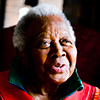



McElrath-Bey, 39, was raised in Back of the Yards and convicted of murder before he was old enough to drive. He now serves as a crusader for juvenile justice with the national Campaign for the Fair Sentencing of Youth and recently launched the Incarcerated Children’s Advocacy Network, which he hopes will help connect formerly incarcerated youth, many of whom were convicted under extreme sentencing guidelines. He lives with his girlfriend and their three-year-old daughter in Logan Square.
Interview by Jake Malooley
Photos by Jeffrey Marini

I was convicted of first-degree murder when I was 15. At the time I had an extensive rap sheet: 19 arrests, seven convictions—everything from armed robbery to aggravated battery to weapons charges.
The incident occurred on a typical October night in my old neighborhood, Back of the Yards. But what happened that night has defined my life ever since.
Me and some friends, who were also gang involved, were hanging out. I don’t want to get too specific, but the fact of the matter is that the victim, who was a year older than me, was beaten and stabbed to death. I did not physically kill him, but I played a role in luring him into the abandoned building where he was killed, and I was the one who was later sent by my gang leaders to cover up evidence by burning the building where his body was.
When I pled guilty, the state’s attorney wrote, “The defendant has an extensive juvenile arrest record indicative of a violent nature. Under no circumstances should he be considered for early release.” The picture they painted of me in that courtroom was that of a monster, someone incapable of change. They immediately transferred me to the adult criminal court, where I was faced with the same sentencing reserved for the worst adult offenders.
My codefendant was 14, and he received 40 years. Luckily I had a public defender who never lost sight of my youthfulness. She said in court, “He deserves another chance. He’s not beyond rehabilitation.” She talked the sentence down to 25 years.

I served 13 years, and now I’ve been out 12 years, so the amount of experiences I missed out on is something I can finally conceptualize.
My childhood was pretty choppy. I had a very unstable home life. My mother and father separated when I was very young. She didn’t have stable housing, and my mom, my older brother, and I ended up at a north-side Salvation Army shelter. My mom finally got her own place, met my little sister’s father, and soon after my sister was born, there were allegations that my stepfather was abusing us. So my siblings and I were taken to a foster home where we stayed with this elderly woman. If we’d make a mess or caused small infractions, she would whup us with an extension cord or belt.
I can’t think of a time growing up when I wasn’t living in fear. When I was eight years old, my siblings and I went to live with my mom and her new boyfriend, a factory worker. On Fridays he would get paid and go straight to the bar. It was always my mother’s mission to catch him before he spent all the money. One time he hit her with a beer bottle. It was pure madness.


By the time I was 11, I started running away and was getting involved in a gang. That’s when I was shot in the face. My friend and I were in an alley, and he was playing with a gun provided by the gang. The next thing I knew—boom! The bullet entered under my left eye, shattered the bone, traveled through my sinus, and threw fragments in every direction. It damaged my retina to the point where my vision is still a blur. That could’ve been my swift end, but I guess I was meant for more.
At that point, I was in the streets 24/7, carrying a gun wherever I went, staying in abandoned buildings and with friends. I was a hyper kid, so the nickname just stuck: Speedy. Strange enough, I was always getting caught. One night we went into a bar and assaulted a rival gang member. The lady who owned the bar shot one of my friends as he ran out the door, then she turned the gun on me and said, “If you move, I’m gonna blow your fucking head off.”
These days I’m back in my old neighborhood. I use a cubicle at Precious Blood Ministry of Reconciliation, a restorative justice program, as office space. I work for the Campaign for the Fair Sentencing of Youth, a Washington, D.C.-based organization that coordinates efforts across the nation to address extreme sentencing. I often talk to judges and state’s attorneys to persuade them that children do have the capacity for positive change.

Most people look at it like if you commit an adult crime you should get an adult consequence. What we’re learning now through developmental neuroscience is that the executive part of children’s brains are not physically developed. It’s indicative of children being controlled by more primitive parts of their brains.
While in solitary at Pontiac Correctional Center, I was finally faced with myself. One of the most nightmarish things is waking up in a cell and realizing you’re not the same person who committed the crime that put you there.
I started reading the Bible. The tattoo on my hand I did while in the hole. It’s a rosary with 11 beads on one side of the crucifix and seven on the other side—when I was 11 years old I joined a gang; seven years later I left the gang.
That was a turning point, and I knew education could be my lifeline. While incarcerated, I earned an associate’s degree from Carl Sandburg College and a bachelor’s degree from Roosevelt University. I leaned toward social services, but I was denied jobs due to restrictions as an ex-con: I could not work with most vulnerable populations.

So I got a job at Starbucks as a barista. If I ever write a book, I’m going to call that chapter “From Lockdown to Lattes.” I went back to Roosevelt University and got my master’s degree in counseling. I was in seventh grade when I got locked up, so this was the first time my mother had seen me walk down an aisle to collect a diploma.
I first got a job with CeaseFire as an outreach worker. I eventually landed at Northwestern assisting with a study of people who entered the juvenile justice system at a young age. The shocking thing: that population has a much higher rate of early, violent deaths. Of the 1,800 people involved, more than 100 have passed away.
I met many individuals who were at rock bottom. I met other people who have grown up, matured, and have their own businesses. The majority grow out of deviant behavior. Give these guys a job, it transforms their whole lives.
Before my position ended with Northwestern this past spring, I gave a TEDx talk about the human capacity for positive change and how no child is born bad. I’m not saying this out of some sense of pure human decency—no, empirically we know children are not going to be the same when they become adults.
I’m not saying they should have a get-out-of-jail-free card. I’m saying you can’t give kids life sentences without parole. If we take advantage of their impressionability, we can inject positive values. I’m not the exception to the rule.






















